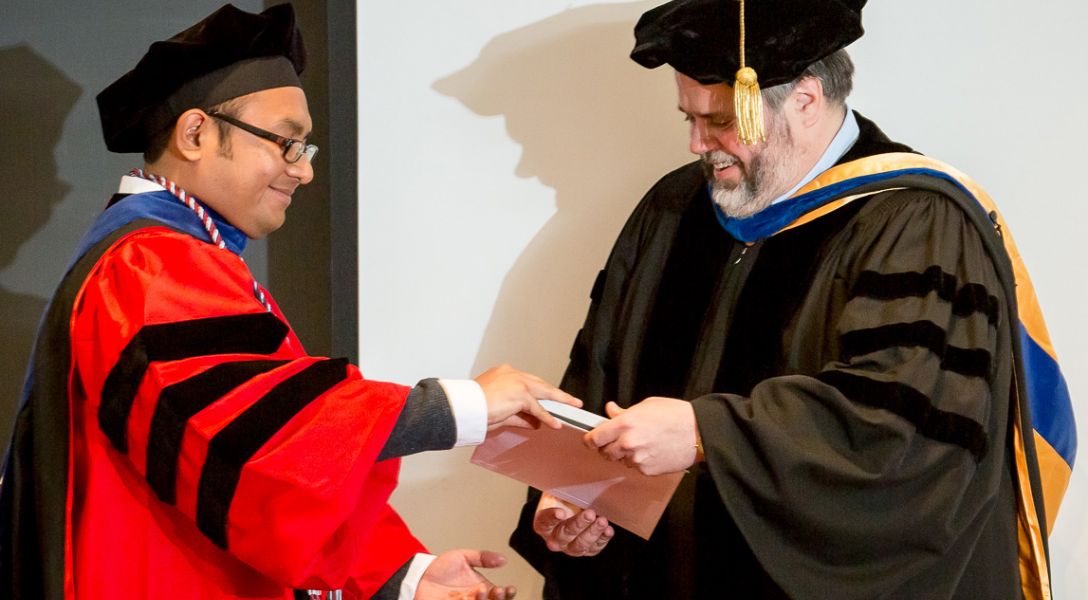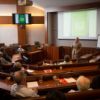The Doctor of Philosophy program in the Field of Statistics is intended to prepare students for a career in research and teaching at the University level or in equivalent positions in industry or government. A PhD degree requires writing and defending a dissertation. Students graduate this program with a broad set of skills, from the ability to interact collaboratively with researchers in applied fields, through the formulation and computational implementation of novel statistical models and methods to demonstrating mathematically that these methods have desirable statistical properties. Cornell's PhD alumni have gone on to high profile positions in all of academia, industry and government. You can view the ![]() Statistics PhD Field Manual for additional information.
Statistics PhD Field Manual for additional information.
Cornell University does not offer a separate Masters of Science (MS) degree program in the field of Statistics. Applicants interested in obtaining a masters-level degree in statistics should consider applying to Cornell's MPS Program in Applied Statistics.
Choosing a Field of Study
There are many graduate fields of study at Cornell University. The best choice of graduate field in which to pursue a degree depends on your major interests. Statistics is a subject that lies at the interface of theory, applications, and computing. Statisticians must therefore possess a broad spectrum of skills, including expertise in statistical theory, study design, data analysis, probability, computing, and mathematics. Statisticians must also be expert communicators, with the ability to formulate complex research questions in appropriate statistical terms, explain statistical concepts and methods to their collaborators, and assist them in properly communicating their results. If the study of statistics is your major interest then you should seriously consider applying to the Field of Statistics.
There are also several related fields that may fit even better with your interests and career goals. For example, if you are mainly interested in mathematics and computation as they relate to modeling genetics and other biological processes (e.g, protein structure and function, computational neuroscience, biomechanics, population genetics, high throughput genetic scanning), you might consider the Field of Computational Biology. You may wish to consider applying to the Field of Electrical and Computer Engineering if you are interested in the applications of probability and statistics to signal processing, data compression, information theory, and image processing. Those with a background in the social sciences might wish to consider the Field of Industrial and Labor Relations with a major or minor in the subject of Economic and Social Statistics. Strong interest and training in mathematics or probability might lead you to choose the Field of Mathematics. Lastly, if you have a strong mathematics background and an interest in general problem-solving techniques (e.g., optimization and simulation) or applied stochastic processes (e.g., mathematical finance, queuing theory, traffic theory, and inventory theory) you should consider the Field of Operations Research.
Residency Requirements
Students admitted to PhD program must be "in residence" for at least four semesters, although it is generally expected that a PhD will require between 8 and 10 semesters to complete. The chair of your Special Committee awards one residence unit after the satisfactory completion of each semester of full-time study. Fractional units may be awarded for unsatisfactory progress.
Your Advisor and Special Committee
The Director of Graduate Studies is in charge of general issues pertaining to graduate students in the field of Statistics. Upon arrival, a temporary Special Committee is also declared for you, consisting of the Director of Graduate Studies (chair) and two other faculty members in the field of Statistics. This temporary committee shall remain in place until you form your own Special Committee for the purposes of writing your doctoral dissertation. The chair of your Special Committee serves as your primary academic advisor; however, you should always feel free to contact and/or chat with any of the graduate faculty in the field of Statistics.
The formation of a Special Committee for your dissertation research should serve your objective of writing the best possible dissertation. The Graduate School requires that this committee contain at least three members that simultaneously represent a certain combination of subjects and concentrations. The chair of the committee is your principal dissertation advisor and always represents a specified concentration within the subject & field of Statistics. The Graduate School additionally requires PhD students to have at least two minor subjects represented on your special committee. For students in the field of Statistics, these remaining two members must either represent (i) a second concentration within the subject of Statistics, and one external minor subject; or, (ii) two external minor subjects. Each minor advisor must agree to serve on your special committee; as a result, the identification of these minor members should occur at least 6 months prior to your A examination.
Some examples of external minors include Computational Biology, Demography, Computer Science, Economics, Epidemiology, Mathematics, Applied Mathematics and Operations Research. The declaration of an external minor entails selecting (i) a field other than Statistics in which to minor; (ii) a subject & concentration within the specified field; and, (iii) a minor advisor representing this field/subject/concentration that will work with you in setting the minor requirements. Typically, external minors involve gaining knowledge in 3-5 graduate courses in the specified field/subject, though expectations can vary by field and even by the choice of advisor. While any choice of external minor subject is technically acceptable, the requirement that the minor representative serve on your Special Committee strongly suggests that the ideal choice(s) should share some natural connection with your choice of dissertation topic.
The fields, subjects and concentrations represented on your committee must be officially recognized by the Graduate School; the Degrees, Subjects & Concentrations tab listed under each field of study provides this information. Information on the concentrations available for committee members chosen to represent the subject of Statistics can be found on the Graduate School webpage.
Statistics PhD Travel Support
The Department of Statistics and Data Science has established a fund for professional travel for graduate students. The intent of the Department is to encourage travel that enhances the Statistics community at Cornell by providing funding for graduate students in statistics that will be presenting at conferences. Please review the Graduate Student Travel Award Policy website for more information.
Completion of the PhD Degree
In addition to the specified residency requirements, students must meet all program requirements as outlined in Program Course Requirements and Timetables and Evaluations and Examinations, as well as complete a doctoral dissertation approved by your Special Committee. The target time to PhD completion is between 4 and 5 years; the actual time to completion varies by student.
Students should consult both the Guide to Graduate Study and Code of Legislation of the Graduate Faculty (available at www.gradschool.cornell.edu) for further information on all academic and procedural matters pertinent to pursuing a graduate degree at Cornell University.













